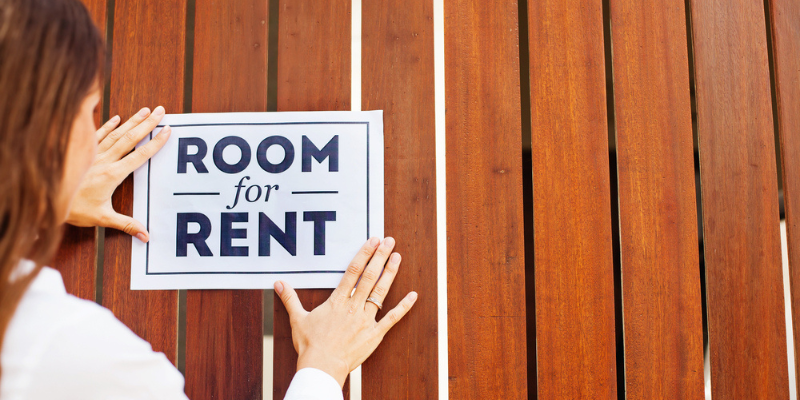

Determine whether your local laws and community allow for a tenant. Most people can use the 2+1 rule which states that two people plus one extra occupant can occupy a bedroom. HUD guidelines state that each person should have 165 square feet in a home.
Places like California, Michigan, New Jersey, and New York have changed occupancy limits to only include how many people can live in a dwelling compared to how many unrelated adults can live together. In other places like Salt Lake City, it is illegal for more than three unrelated adults to live in any individual dwelling unit.
Be sure to check your local laws for rules about zoning and occupancy limits.
You also need to verify renting is allowed with your Homeowners Association, if you have one. Some HOAs may restrict rentals entirely while others may have a cap. The HOA may also have specific rules for renting such as submitting a copy of the lease agreement.
Be sure to notify your tenant of HOA rules and bylaws to avoid any fines or unhappy board members.

All landlords must comply with fair housing laws and avoid discrimination when screening and choosing renters. Fair Housing Laws prohibit discrimination on the basis of:
However, the rules are slightly different when renting out a room in a house you live in. Due to the Mrs. Murphy law, you can be more selective. For example, a female doesn’t have to allow a male applicant to become her tenant. However, keep in mind that discrimination based on race or color has effectively been banned by case law.
Each state has landlord-tenant rights that vary. Even though the person renting a room in your house is in your personal space, they still have the right to privacy.
For example, most states agree that landlords must have permission to enter the room of a tenant. Tenants also have the right to “quiet enjoyment”. A landlord cannot evict a tenant without cause and must allow them to live in peace.
Landlords have a responsibility to keep their units safe and livable (also called “warranty of habitability”). While laws vary by state, these requirements often include:
Be sure the tenant has a safe and clean space to live. Planning to rent a space filled with random items or an unfinished garage won’t cut it.
Landlords must carry the proper type of insurance. You will need to call your insurance agent to determine if you have the proper coverage.
Many insurance companies will only increase the cost of your policy if you have more than two tenants. But, opting to keep your plans to rent out a room a secret can cause your insurer to drop you.
It’s also a good idea to require the tenant to have renters insurance. Renters insurance will protect the tenant’s personal property, liability, and additional living expenses.

You must report income for any rent you receive, but there are deductible expenses. The rules state that you can deduct any expenses that come from rental activity. However, this rule doesn’t apply to the whole house. For example, if you need to replace the carpet in the rented room, you can deduct those expenses.
For all other expenses, you must identify how much space in your home is used as personal space compared to rental space. For example, if your home is 2,500 square feet and you rent one room and one bathroom for a total of 500 square feet you use 20% of your home as a rental and 80% for personal use.
In the example listed above, you could deduct 20% of expenses for the entire home for the following:
A rental application is not required to rent out a room in your house. But, in this situation, you will want to take every precaution. Sharing your personal space with someone should be taken seriously.
On the rental application, be sure to get their permission to run a full background, criminal, and credit check—even if it’s someone you know.
However, be sure you follow the guidelines of your state for what you can and can’t ask on a rental application. You will have a bit more leniency as the tenant will live in your home, but you still have to follow the law.
A written lease in many locations isn’t required, but it’s important to have one anyway. A lease agreement will help you to create and maintain a positive relationship with your new roommate.
You can use this opportunity to set expectations, rules, and guidelines. For example, will the tenant have access to common spaces such as the living room or laundry room? How will you keep the property tidy? How often will they have an overnight guest? Does the rent cover their part of the utilities?
There are several room rental agreements available online that can help you to identify important items to include in your lease.
Most states require a written lease agreement if the arrangement lasts longer than a year.

It’s important to have a backup plan should things not work out. Rules about lease termination depend on your location and the type of lease you have.
Most states require landlords to provide a 30-day notice. However, there are some exceptions. Pennsylvania, Utah, and Florida require only a 15-day notice while Connecticut requires only a 3-day notice. Delaware, Georgia, and Maryland require a 60-day notice.
Check your local and state laws for specifics on lease termination and how to break a lease early, if necessary.
Here’s what you need to consider before leasing out a room:
After you have determined the rules for renting out a room in your house, it’s time to take the next steps. The process is like renting out a house you own, but on a more serious level as you will be living with this person. Here are the steps you need to take: